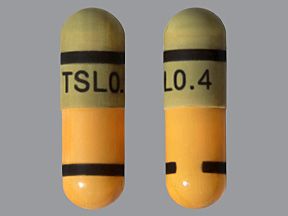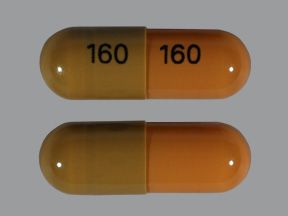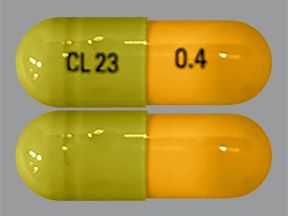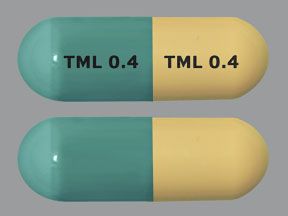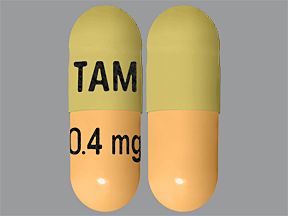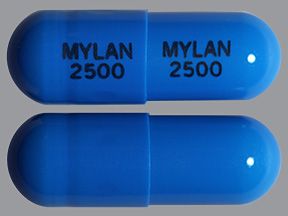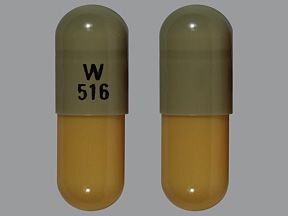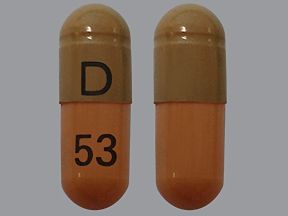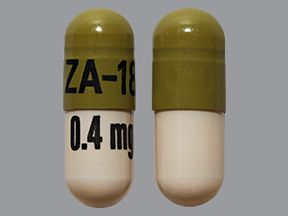- Tamsulosin oral capsule is available as a brand-name drug and a generic drug. Brand name: Flomax.
- Tamsulosin comes only as a capsule you take by mouth.
- Tamsulosin oral capsule is used to treat the symptoms of benign prostatic hyperplasia (BPH).
Tamsulosin is a prescription drug. It comes as a capsule you take by mouth.
Tamsulosin oral capsule is available as the brand-name drug Flomax. It’s also available as a generic drug. Generic drugs usually cost less than the brand-name version. In some cases, they may not be available in every strength or form as the brand-name drug.
This drug may be used as part of a combination therapy. That means you may need to take it with other drugs.
Why it’s used
Tamsulosin is used to treat the symptoms of benign prostatic hyperplasia (BPH). BPH is a condition that can occur in men. With BPH, the prostate is enlarged but isn’t cancerous.
Symptoms of BPH include trouble urinating, and a frequent or urgent need to urinate that often occurs at night.
How it works
Tamsulosin belongs to a class of drugs called alpha-adrenergic blockers. A class of drugs is a group of medications that work in a similar way. These drugs are often used to treat similar conditions.
Tamsulosin works by relaxing the muscles in your bladder and prostate. This helps improve the flow of your urine.
Tamsulosin oral capsule doesn’t cause drowsiness, but it can cause other side effects.
More common side effects
The more common side effects that can occur with tamsulosin include:
- headache
- dizziness
- runny nose
- diarrhea
- cough
- decreased semen
- loss of energy or muscle strength
- sore throat or trouble swallowing
- back or chest pain
- tiredness
- nausea
If these side effects are mild, they may go away within a few days or a couple of weeks. If they’re more severe or don’t go away, talk to your doctor or pharmacist.
Serious side effects
Call your doctor right away if you have serious side effects. Call 911or local emergency services if your symptoms feel life-threatening or if you think you’re having a medical emergency. Serious side effects and their symptoms can include the following:
- abnormal ejaculation
- priapism (painful, long-lasting erection)
- flu-like symptoms
- blurred vision
- low blood pressure that causes you to feel lightheaded, faint, or dizzy when changing positions
- allergic reaction, with trouble breathing, fever, swelling of your throat or tongue, rash, itching, or hives
Disclaimer: Our goal is to provide you with the most relevant and current information. However, because drugs affect each person differently, we cannot guarantee that this information includes all possible side effects. This information is not a substitute for medical advice. Always discuss possible side effects with a healthcare provider who knows your medical history.
Tamsulosin oral capsule can interact with other medications, vitamins, or herbs you may be taking. An interaction is when a substance changes the way a drug works. This can be harmful or prevent the drug from working well.
To help avoid interactions, your doctor should manage all of your medications carefully. Be sure to tell your doctor about all medications, vitamins, or herbs you’re taking. To find out how this drug might interact with something else you’re taking, talk to your doctor or pharmacist.
Examples of drugs that can cause interactions with tamsulosin are listed below.
Acid-blocking drug
Taking cimetidine with tamsulosin can increase the levels of tamsulosin in your body. This raises your risk of side effects from tamsulosin. These drugs should be used together cautiously.
Antibiotic
Taking erythromycin with tamsulosin could increase the levels of tamsulosin in your body. This can raise your risk of side effects from tamsulosin. These drugs should be used together cautiously.
Antidepressant (SSRI)
Taking paroxetine with tamsulosin can increase the levels of tamsulosin in your body. This raises your risk of side effects from tamsulosin. These drugs should be used together cautiously.
Antifungal drugs
Taking certain antifungals with tamsulosin can increase the levels of tamsulosin in your body. This raises your risk of side effects from tamsulosin. Examples of these drugs include:
- terbinafine (these drugs should be used together cautiously)
- ketoconazole (do not use this drug with tamsulosin)
Erectile dysfunction (ED) drugs
Taking ED drugs with tamsulosin can cause very low blood pressure. Examples of these drugs include:
- sildenafil
- tadalafil
- vardenafil
Other benign prostatic hyperplasia drug
Taking alfuzosin with tamsulosin could worsen low blood pressure, a side effect of tamsulosin. Symptoms can include dizziness, fainting, and falls.
Alpha blockers
Taking drugs called alpha blockers with tamsulosin can cause very low blood pressure. Examples of alpha blockers include:
- doxazosin
- prazosin
Disclaimer: Our goal is to provide you with the most relevant and current information. However, because drugs interact differently in each person, we cannot guarantee that this information includes all possible interactions. This information is not a substitute for medical advice. Always speak with your healthcare provider about possible interactions with all prescription drugs, vitamins, herbs and supplements, and over-the-counter drugs that you are taking.
This dosage information is for tamsulosin oral capsule. All possible dosages and forms may not be included here. Your doctor will tell you what dosage is right for you. Your dosage, form, and how often you take the drug will depend on:
- your age
- the condition being treated
- the severity of your condition
- other medical conditions you have
- how you react to the first dose
Dosage for benign prostatic hyperplasia (BPH)
Generic: Tamsulosin
- Form: oral capsule
- Strength: 0.4 mg
Brand: Flomax
- Form: oral capsule
- Strength: 0.4 mg
Adult dosage (ages 18–64 years)
Typical dosage: 0.4-mg capsule daily.
Dosage increase: If your body doesn’t respond to the 0.4-mg dose after two to four weeks, your dosage may be increased to 0.8 mg daily.
Senior dosage (ages 65 years and older)
Your body may process this drug more slowly. Your doctor may start you on a lowered dosage so that levels of the drug don’t build up too high in your body. High levels of this drug in your body can be dangerous.
Disclaimer: Our goal is to provide you with the most relevant and current information. However, because drugs affect each person differently, we cannot guarantee that this list includes all possible dosages. This information is not a substitute for medical advice. Always speak with your doctor or pharmacist about dosages that are right for you.
Tamsulosin oral capsule is used for long-term treatment. It comes with risks if you don’t take it as prescribed.
If you stop taking the drug suddenly or don’t take it at all: Your BPH symptoms won’t improve. If you stop taking this drug for several days, talk to your doctor before starting again.
If you miss doses or don’t take the drug on schedule: Your medication may not work as well or may stop working completely. For this drug to work well, a certain amount needs to be in your body at all times.
If you take too much: Taking too much of this drug can cause low blood pressure. This can be dangerous.
If you think you’ve taken too much of this drug, call your doctor or seek guidance from the American Association of Poison Control Centers at 1-800-222-1222 or through their online tool. But if your symptoms are severe, call 911 or go to the nearest emergency room right away.
What to do if you miss a dose: Take your dose as soon as you remember. But if you remember just a few hours before your next scheduled dose, take only one dose. Never try to catch up by taking two doses at once. This could result in dangerous side effects.
How to tell if the drug is working: You should see a decrease in the symptoms of BPH. You may need to urinate less often, have less urgency to urinate, or have a stronger urine stream.
As with all medications, the costs of tamsulosin can vary.
Keep these considerations in mind if your doctor prescribes tamsulosin for you.
General
- You should take this drug 30 minutes after a meal, at the same time each day.
- Don’t crush or cut the capsule.
Storage
- Store this drug at room temperature between 59°F and 86°F (15°C and 30°C).
- Don’t freeze this medication.
- Keep this drug away from light.
- Don’t store this medication in moist or damp areas, such as bathrooms.
Refills
A prescription for this medication is refillable. You should not need a new prescription for this medication to be refilled. Your doctor will write the number of refills authorized on your prescription.
Travel
When traveling with your medication:
- Always carry your medication with you. When flying, never put it into a checked bag. Keep it in your carry-on bag.
- Don’t worry about airport X-ray machines. They can’t harm your medication.
- You may need to show airport staff the pharmacy label for your medication. Always carry the original prescription-labeled container with you.
- Don’t put this medication in your car’s glove compartment or leave it in the car. Be sure to avoid doing this when the weather is very hot or very cold.
Clinical monitoring
BPH can occur with more serious conditions such as prostate cancer. Before starting treatment with tamsulosin, talk to your doctor about being screened for prostate cancer.
You will have regular checkups with your doctor. During these visits, your doctor will check whether your symptoms of BPH have improved.
There are other drugs available to treat your condition. Some may be better suited for you than others. Talk to your doctor about other options that may work for you.
- Low blood pressure warning: Tamsulosin can cause you to feel dizzy or cause a drop in your blood pressure when you stand up after sitting or lying down. After taking your first dose or an increased dose, be sure you’re aware of how tamsulosin affects you before you perform any activity that could cause injury.
- Priapism warning: Rarely, tamsulosin can cause priapism. This is a persistent, painful erection that isn’t related to sexual activity. If you have priapism, contact your doctor right away. If priapism isn’t treated, it could lead to permanent impotence (not being able to have an erection).
- Skin reactions warning: Though rare, this drug can cause severe skin reactions, including a serious condition called Stevens-Johnson syndrome. These skin reactions can cause raised welts, facial swelling, fever, and trouble breathing. See a doctor right away or call 911 if you have signs of a sudden or severe skin reaction after taking this drug.
- Intraoperative floppy iris syndrome (IFIS) warning: IFIS is a complication that can occur during surgery for cataracts or glaucoma. Although rare, this problem has been reported with people taking tamsulosin. If you need to have cataract or glaucoma surgery, be sure to tell your doctor or surgeon that you’re taking tamsulosin.
This drug comes with several warnings.
Allergy warning
Tamsulosin can cause severe allergic reactions, such as a serious condition called Stevens-Johnson syndrome. These reactions can cause symptoms including:
- trouble breathing
- swelling of your throat or tongue
- rash, itching, hives
If you have an allergic reaction, call your doctor or local poison control center right away. If your symptoms are severe, call 911 or go to the nearest emergency room.
Don’t take this drug again if you’ve ever had an allergic reaction to it or to sulfa. Taking it again could be fatal (cause death). Sulfa is an ingredient found in certain drugs. Tell your doctor if you’ve had a serious or life-threatening allergic reaction to sulfa.
Disclaimer: Medical News Today has made every effort to make certain that all information is factually correct, comprehensive, and up-to-date. However, this article should not be used as a substitute for the knowledge and expertise of a licensed healthcare professional. You should always consult your doctor or other healthcare professional before taking any medication. The drug information contained herein is subject to change and is not intended to cover all possible uses, directions, precautions, warnings, drug interactions, allergic reactions, or adverse effects. The absence of warnings or other information for a given drug does not indicate that the drug or drug combination is safe, effective, or appropriate for all patients or all specific uses.

